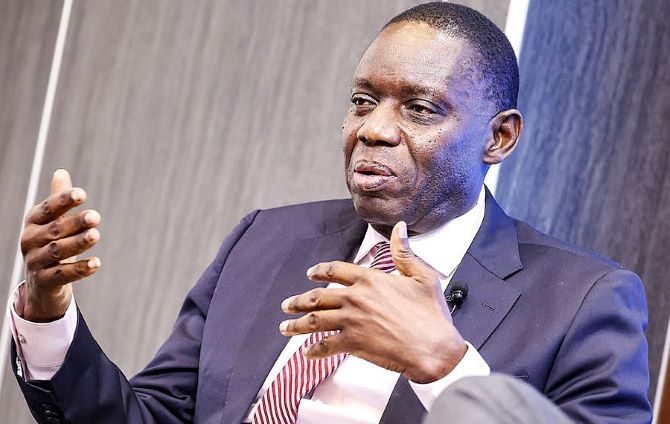KAMPALA, November 15, 2025 — Bank of Uganda [BoU] Governor Michael Atingi-Ego has urged Uganda to take decisive steps to position itself at the centre of the global data and Artificial Intelligence [AI] revolution, warning that countries that delay risk becoming “peripheral data providers and technology consumers.”
Delivering a keynote address at the 2025 Data Analytics, Artificial Intelligence & Data Governance Symposium held recently at the Sheraton Kampala Hotel, Atingi-Engo said Uganda stands at a historic moment where choices made now will shape its economic competitiveness for decades.
The symposium, organised by Task Managers Limited in partnership with Makerere University Business School, convened policymakers, technologists, academics, and private-sector innovators under the theme “From Insight to Impact: Operationalising Data, AI, and Data Governance for Sustainable Growth.”
Atingi-Ego described the present as a convergence of two powerful forces: the surge in global data and rapid advances in AI. He noted that data generation has expanded from 2 zettabytes in 2010 to 149 zettabytes in 2024, yet most of it remains unused, “a major missed opportunity.”
He argued that AI now offers unprecedented capability to convert unstructured information into actionable intelligence, but society is still learning how to harness its power. While global AI investment may show modest short-term returns, he said its long-term economic impact—projected at US$20 trillion by 2030, will be transformative.
AI and financial stability
Turning to Uganda’s financial sector, the Governor stressed that BoU’s mandate can no longer rely on traditional tools alone. He said data and AI are becoming central to financial oversight, noting their growing use across Africa in credit scoring, fraud detection, and regulatory compliance. He cited Kenya’s FarmDrive and Uganda’s Ensibuuko as practical examples expanding access to finance for underserved communities.
Atingi-Ego also reaffirmed the Bank’s work on digital payment interoperability and its exploration of Central Bank Digital Currencies, emphasising that any innovation must reinforce trust and stability within the financial system.
Infrastructure and investment
The Governor called for urgent investment in digital infrastructure, data centres, fibre networks, and renewable energy, if Uganda is to compete for global AI capital. He highlighted stark disparities, noting that while the United States hosts more than 5,000 data centres, most of Africa remains largely absent from the map.
He added that high-quality national data is becoming a magnet for international investment. BoU’s machine-learning models, already applied in macroeconomic forecasting, are reducing uncertainty and helping strengthen confidence in the economy.
AI for socio-economic transformation
Atingi-Ego outlined AI’s potential across agriculture, natural resource management, healthcare, and education. He pointed to initiatives such as Kenya’s Twiga Foods, Uganda’s Eamiat project, and AI-enabled emergency response systems used during the Covid-19 pandemic.
At the Bank of Uganda, he said, work is underway on a Financial Inclusion Data Dashboard that will provide gender-disaggregated insights. “In a data-driven economy, transformation becomes measurable,” he noted.
The Governor warned that without targeted investment in skills, Uganda risks “premature de-professionalisation,” where technology outpaces workforce capabilities. He stressed that while AI automates routine tasks, it increases the value of judgement, creativity, leadership, and strategic thinking.
He called for reforms in foundational education, national upskilling efforts, and the development of an AI-native entrepreneurial ecosystem. He also commended The Corporate Trainer platform for contributing to digital-skills development.
Governance and public trust
With declining global trust in AI, Atingi-Ego underscored the need for a strong national governance framework to guard against algorithmic bias, privacy breaches, deepfakes, and concentration of technological power. He referenced global efforts such as the Organisation for Economic Co-operation and Development [OECD] AI Principles and the EU AI Act, urging African countries to craft context-appropriate regulation that balances innovation with public protection.
He called for collective action: “Policy institutions must prioritise data governance and digital infrastructure; private-sector innovators should champion ethical AI and invest in workforce readiness; academia must tighten the research-policy link; and development partners should fund AI capacity, skills, and infrastructure. “Standing still is not an option,” he said.
Atingi-Ego reaffirmed BoU’s commitment to becoming a fully data-driven central bank. “Our success is measured by how effectively our systems serve Ugandans,” he said.
Several participants from government, the private sector, and civil society spoke at the symposium.
The Deputy Speaker of Parliament Thomas Tayebwa who was the Chief Guest echoed the need to strengthen national data capabilities to attract major investors, noting that Uganda still underutilises data, especially in identifying skilled professionals.
Opportunity Bank Board Chairperson Jacqueline K. Opondo urged leaders to champion internal organisational change and hire data and AI specialists to drive growth.
Economist Dr. Fred Muhumuza emphasised the importance of domestic data in improving services, cutting inefficiencies, and boosting revenue. He highlighted how school payment data could help identify financially stressed households and prevent student dropouts.
https://thecooperator.news/bou-raises-shs-1-86trn-from-treasury-bills-and-bonds-in-june-2025/
Buy your copy of theCooperator magazine from one of our countrywide vending points or an e-copy on emag.thecooperator.news
